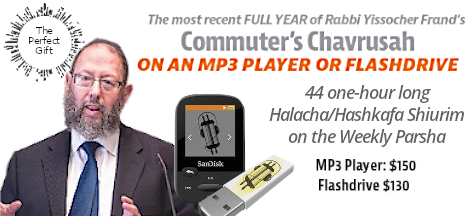

These divrei Torah were adapted from the hashkafa portion of Rabbi Yissocher Frand’s Commuter Chavrusah Series on the weekly portion: ##1310 – Giving Gifts to Non-Jews. Good Shabbos!
The pasuk says that on his way down to Mitzrayim, Avram realized that Sora was a beautiful woman. He was afraid that she would be desirable as a wife in Mitzrayim, and that he would be killed in order that Sora could be taken as someone else’s wife. As we know, Avram said, “…Please say that you are my sister, that it may go well with me for your sake, and that I may live on account of you.…” (Bereshis 12:13).
Rashi says on the words “so that it will be good for me” – this means that I will be given presents. Why Avram Avinu would be so interested in presents is itself a question, but a more pressing question is why Avram indeed accepted these presents from the Egyptians and, in fact, became a wealthy man because of them. Yet, shortly thereafter in the parsha, when Avram Avinu saved Lot, and the King of Sodom offered him the spoils of war, Avram refused to take them. “… I have raised my hand to Hashem, G-d, the Most High, Maker of heaven and earth, if so much as a thread or a shoelace, or if I shall take from anything that is yours! So you shall not say ‘It is I who made Avram rich'” (Bereshis 14: 22-23). If Avram was worried about people saying that the King of Sodom made him rich, why wasn’t he worried about people saying that the King of Mitzrayim made him rich? If Avram took into account the teaching of Shlomo Hamelech “…and the one who despises presents will live” (Mishlei 15:27) regarding Melech Sodom, why did Avram have such a sudden change of heart from his earlier ready acceptance of gifts?
There is an interesting Medrash that explains this contradiction and teaches a very important lesson. On the pasuk, “And he proceeded on his journeys…” (Bereshis 13:3), the Medrash Tanchuma notes that when Avram returned from Mitzrayim back to Eretz Canaan, he went to all the places that he visited on the way down to Mitzrayim, in order to pay his bills. Apparently, on the way down to Mitzrayim, Avram did not have money and he needed to borrow money to pay for his lodging and expenses. It was only on the way back from Mitzrayim that Avram had money to repay the debts that he had accumulated on the trip to Mitzrayim.
We derive two important lessons from this Medrash:
- When people lend you money, pay them back. This may seem like an obvious statement, but unfortunately, this is not always done.
- Do not be a tzadik on someone else’s account. This means that it is fine to be righteous and have personal chumras (stringencies) and hidurim (ritual beautifications) if these chumras and hidurim only effect you. But if someone wants to practice exceptionally righteous religious behavior (for example, refusing to accept gifts because Shlomo Hamelech taught “the one who hates presents will live,”) then he had better be certain that his personal piety is not causing the people to whom he is in debt to go unpaid. A person’s fiscal responsibilities come first. Chumras and hidurim can only be built upon that baseline of integrity.
Avram in Mitzrayim had to tell Sarah “…in order that it will be good for me for your sake…”. He was in debt at the time and he did not have the luxury of being concerned that people would be able to claim “It is because of me that Avram became rich.” Later on in the parsha, Avram had prospered. By then he was “heavy with cattle, with silver and with gold.” (Bereshis 13:2). By the time Avram went out to do battle for the King of Sodom, he was a wealthy man. Aha! A wealthy man has the ability and the luxury to be able to say “One who hates presents, he will live.”
I can give a couple of examples of this principle of “Don’t be a tzadik on someone else’s cheshbon“:
Rav Dovid Kronglas, zt”l, (1908-1972), the Mashgiach of Yeshivas Ner Israel, had a “chumrah” in shechitah, such that he did not eat beef. He thus had chicken for supper virtually every night. (There are fewer halachic issues with the ritual slaughter of birds than with animals). However, this is not a stringency that he imposed on his wife and children. His family ate meat. He was not going to restrict the members of his family from meatballs, hamburgers, roast, or steak because he accepted certain halachic stringencies upon himself.
Another example of not imposing personal chumras on others is evident in a story told over by the Tolner Rebbe. A young Kollel student came to Rav Schach, zt”l, and complained to him that his Rosh Kollel told him that he should not learn so late at night. Rav Schach told the young student to have his Rosh Kollel come see him. The Rosh Kollel came to visit Rav Schach, who asked him about the instructions he gave to his young Kollel student.
The Rosh Kollel said, “This young man has recently been looking unhappy – worried and perturbed about something. I asked him what was wrong. He explained that his wife got a new job, for which she needs to leave the house very early. She needs to get up even earlier to make the children’s lunches and get them off to school. She is not getting enough sleep because she needs to get up so early. She is therefore not in a very good mood, and it is affecting their shalom bayis (marital harmony).
The Rosh Kollel asked his student, “So why don’t you get up early and help make the lunches and get the children off to school?” The student gave as an excuse the fact that he stayed up learning late at night. The Rosh Kollel advised him: Don’t learn so late at night, go to sleep earlier, and get up earlier so you can help your wife make the lunches and get the children off to school. That was “the story behind the story.”
Rav Schach then called the young man back in and told him “Your Rosh Kollel is 100% correct. If you want to learn late at night, that is all fine and good. But if that negatively affects your wife, you cannot do that. You are a baal chov (in debt) to her. When you gave your wife her kesuvah, you pledged to support her in the custom of all Jewish men. She is supporting you! For that, she gets a great blessing. But you owe her. You can’t be a tzadik on her cheshbon. If you are learning so late that it prevents you from getting up early to help your wife, then don’t stay up so late! You have a primary obligation, and that primary obligation is to help your wife.
Hashem Said to His World “Enough”
The Beis HaLevi (Rav Yosef Dov Halevi Soloveitchik, (1820-1892)) notes that when Avraham Avinu received the mitzvah of milah in this week’s parsha, it is the first mention of the name Sha-k-ai (Shin, Daled, Yud) of the Almighty in the Torah. HaKadosh Baruch Hu told Avraham, “I am Kel Sha-k-ai, walk before Me and be perfect.” (Bereshis 17:1).
What is the specific connection between the Name Sha-k-ai and the mitzvah of milah? The Beis Halevi says that the connotation of the name Shin-Daled-Yud is that “I am the One who said to the world ‘Dai‘ (Enough)”. This name indicates that the Ribono shel Olam put the brakes, so to speak, on the act of creation.
The Medrash elaborates: Ma’aseh Bereshis (the Story of Creation) was an ongoing process. Had it not been for the fact that at a certain point, Hashem said to the world “Enough” (Dai – Daled, Yud), the process of creation would have continued. As a result, instead of going out into the field to harvest bushels of wheat, a person would go out into the field and harvest loaves of bread. The seed would not only produce the wheat, but creation would continue and the wheat would independently go on to produce bread and other edible products. Likewise, creation would not stop with just flax and linen, but rather suits and ready-made garments of all sizes would be “manufactured”.
The Ribono shel Olam said, “No. That is not the way I want My world to work. I am the One who said to My world ‘Dai – Enough!’ because I want to leave something for man to do.” This, says the Beis Halevi, is why the mitzvah of milah appears with the Divine Name of Sha-k-ai. As the Medrash relates, the wicked Turnus Rufus asked Rabbi Akiva, “If Hashem wanted man to be circumcised, why was he born with foreskin – why weren’t we all born already circumcised?” The answer to that question is that Hashem wants us to perfect ourselves. We are not born perfect. No one comes into this world as a finished product. Man’s charge in this world is to perfect himself. This is the underlying message of the mitzvah of milah.
When I was once in England, Dayan Chanoch Ehrentreu (Av Beis Din of the London Beis Din (1932-2022)) told me a beautiful thought from his predecessor on the London Beis Din, Dayan Morris Swift (1907-1983):
We put a mezuzah on our door containing the Torah chapters: Shema Yisrael and V’haya Im Shamoa. However, we do not see those chapters. The parchment is rolled up so it is impossible to see what is written inside. The only part of the mezuzah that we see is the outside of the mezuzah’s parchment where the name Shin Daled Yud is written. Dayan Swift said that the message is “I am the one who said to My world ‘Enough!'” Just as at the time of the original creation, Hashem said, “I am going to create the world but I am going to leave something ‘left over’ for man to complete”, so too, each man’s creation is ‘incomplete,’ leaving over the removal of the foreskin as a covenantal task for man to thereby improve himself.
And in the spirit of havei domeh lo (man ‘imitating’ G-d’s Actions), man too, in his own “Home Improvement” projects, does not need to complete every last detail, by building the greatest palace in the world. The message of Shin-Daled-Yud is He who said to His world ‘Enough‘ – so too, we need to say to our interior decorator “My ‘world’ is also ‘enough‘”.
I told my handyman “We need a new shower rod” (because our old shower rod keeps falling down). He sent me the links to Home Depot shower rods. It is incredible how many different types and prices of shower rods there are. I am not even talking about the shower curtains. I am merely speaking of the shower rods! Chrome, brush nickel, this and that. Enough! There is a boundary.
That is why the part of the mezuzah that is visible is Shin-Daled-Yud: I am the One who said to My world ‘Enough’.
Transcribed by David Twersky; Jerusalem [email protected]
Technical Assistance by Dovid Hoffman; Baltimore, MD [email protected]
This week’s write-up is adapted from the hashkafa portion of Rabbi Yissochar Frand’s Commuter Chavrusah Series on the weekly Torah portion. A listing of the halachic portions for Parshas Lech Lecha is provided be low:
- # 028 – Conversion (Geirus)
- # 070 – Bris Milah: The Metzizah Controversy
- # 119 – Conversion for Ulterior Motives
- # 166 – The Childless Couple in Halacha
- # 212 – Non-Jews and the Mitzvah of Kibbud Av
- # 256 – Mohel and Baby: Who Goes to Whom
- # 302 – The Mitzvah of Yishuv Eretz Yisroel
- # 346 – Trading Terrorists for Hostages
- # 390 – Geirus — Mitzvah, Reshus, or Issur?
- # 434 – Anesthesia During Milah
- # 478 – Sandik — Can You Change Your Mind?
- # 522 – Calling Avraham, Avrum
- # 566 – Learning Vs. Saving A Life
- # 610 – The Widow & the Divorcee: How Long Must they wait to remarry
- # 654 – Sonei Matonos Yichye – Refusing Gifts
- # 698 – Did the Avos Keep the Torah?
- # 742 – Can You Change Your Mazel?
- # 786 – The On-Time vs. the Delayed Bris
- # 830 – Standing for A Chosen and Kallah At The Chupah
- # 874 – Saving Some-One’s Soul- How Far Must You Go?
- # 918 – Hidur Mitzvah – How Important?
- # 961 – Tying Shoes – Not As Simple As You Think
- #1005 – Inviting People to a Bris – Good Idea or Bad?
- #1049 – Honoring Your Wife
- #1092 – The Baal Teshuva Who Wants To Convert His Non-Jewish Girlfriend
- #1135 – “Schar Pe’sios” – Should You Walk Or Drive To Shul (on weekdays)
- #1178 – Shabbos Milah of A Child Whose Parents Are Not Shomrei Shabbos
- #1222 – Milah For The Son of a Jewish Father and a Non Jewish Mother
- #1266 – The Syrian Sefardic Community’s Ban on Conversion
- #1310 – Giving Gifts to Non-Jews
- #1354 – Should I Stay in the US to Take Care of My Parents or Make Aliya to Eretz Yisroel?
- #1398 – Meshaneh Makom Meshaneh Mazel – Changing Your Mazel
- #1442 – The Importance of Always Staying With The Same Host
- #1486 – Quantity vs. Quality – What wins?
- #1530 – Receiving Gifts: A Good or Bad Idea?
- (2022) – A Postponed Bris Milah – Never on a Thursday?
A complete catalogue can be ordered from the Yad Yechiel Institute, PO Box 511, Owings Mills MD 21117-0511. Call (410) 358-0416 or e-mail [email protected] or visit http://www.yadyechiel.org/ for further information.


